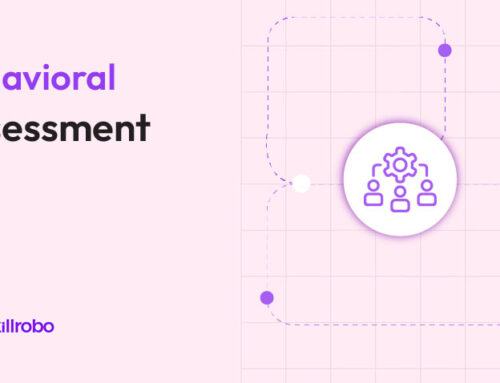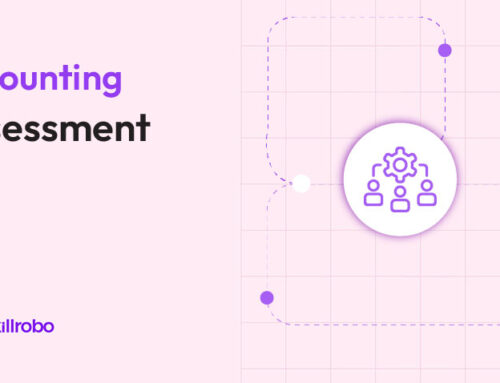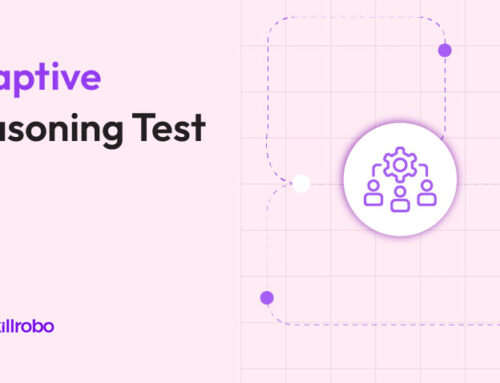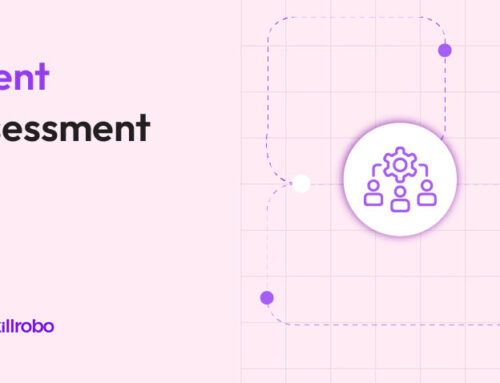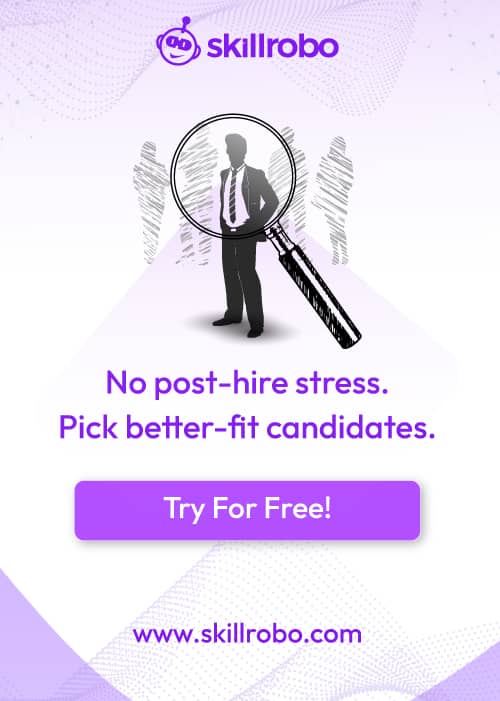Table of Contents
Related articles

Key Takeaways
- Unfair hiring practices stem from unconscious bias, reducing diversity and harming organizational competitiveness.
- Discriminatory practices, like stereotyping, risk legal issues and damage a company’s reputation.
- Pre-employment assessments, like Skillrobo, ensure fair, skill-based hiring, minimizing bias effectively.
- Structured processes and transparency in recruitment promote inclusivity and attract top talent.
Unconscious bias among recruiting managers frequently leads to unfair hiring practices. This may result in hiring a talent pool that is less diversified, which would likely be detrimental to the business and decrease its ability to compete. Not only is it morally right to ensure a fair recruiting process, but it will also increase your company’s competitiveness and help you draw in the most qualified employees. Many unfair employment practices are just unjust and decrease your chances of hiring the finest applicants.
However, not all unfair hiring practices are against the law. Contrarily, discrimination is considered to be against the employment law. So, hiring a candidate with unfair practices will affect the organization’s reputation. Also, every employee desires diversity in their job positions and to be treated honestly and equally regardless of who they are. No longer do they want to be stuck doing the same kind of work.
In this article, we will see what unfair hiring practices are and examples of unfair hiring practices. We’ll also look into tips to avoid unethical hiring practices in your organization.
What Are Unfair Hiring Practices?
Unfair hiring practices are commonly related to the hiring process due to interview bias. Hiring managers can fall for bias or indulge in any other unconscious bias and give preference to one candidate over another. It will not be based on the candidate’s skills, knowledge, and performance criteria. This plays a main role in the announcement of the result of hidden bias, such as confirmation bias or affinity bias.
If the hiring manager decides to hire a candidate based on their physical appearance, background, and the college they studied apart from their skills, it may be considered as an unfair hiring practice. This will lead to the loss of a highly qualified candidate to the organization. Hiring a candidate based on religion, or color will lead to discriminatory hiring practices, which is also bad hiring. These unfair or illegal practices will drag the organization into a lawsuit which affects the organization’s financial status, and brand image.
This is why streamlining the hiring process is important in recruitment. This is where pre-employment assessment tools play a vital role in hiring a candidate without any bias. Recruiting the right talent without any unfair hiring practices will help the organization to achieve its goals.
Examples Of Unfair Hiring Practices
1. Internal Hiring
Employee referral is one major thing in the hiring process which is the first step that all employers do while hiring. Recruiting a candidate by limiting the hiring process to internal hiring strategies will lead to unintentional bias in the interview process. Analyzing people’s skills and knowledge required for that position is the only best way to hire a candidate rather than hiring a candidate with an internal reference. Even though internal hiring gives you the best result, it is always advisable to explore the options and choices and cash in on the advantage of the sourcing strategies.
2. Long-Drawn Interview Process
Implementing a lengthy hiring process will tire the candidate and make them lose their patience while attending the interview. This will affect the reputation of the organization.
Usually, every organization’s recruitment team follows a standard process of interviewing a candidate, starting with a phone call interview followed by a skills assessment and a face-to-face interview. This will extend until the candidate remains suitable for the position. This will also come under unfair hiring practices. This can make the candidate detached or disengaged from the process and will reflect negatively on the company’s reputation. Create the process simple and straightforward to hire a suitable candidate.
3. Overlook Evidence-Based Hiring
Every hiring manager should ensure that they are following evidence-based hiring decisions with accurate data and analytics. The recruitment team should not rush just to fill the job openings but should analyze the candidate’s skill background and hire them. To achieve the target of filling the positions, the hiring manager will hire or reject the candidates easily without proper screening. Due to these unfair practices, the qualified candidates lose the opportunity to get in first. So, the hiring manager should take steps to analyze and verify the evidence.
4. Falling For Stereotypes
Hiring a candidate based on gender, race, sexual orientation, nationality, disability, etc will come under discrimination bias. This could be intentional or unintentional. To overcome these discriminations in the hiring process, using gender-neutral language will help to reach various people and advertise job openings across various regions to avoid geographical preferences, identify the bias happening during the hiring process, and try to avoid unfair hiring practices.
5. Verifying Current Employment Status
Even though it is legally permissible, it is also considered to be one of the unfair hiring practices to ask the candidate about their current employee status. Evaluating a candidate using their current employee status will be considered deeply in discrimination which will not help the hiring process to move forward with potential candidates for the required job openings.
6. Using Unclear Job Descriptions
The job description is one of the most important things for the recruitment team when filling a job position. Using clear language to describe the key responsibilities of the role with the primary function will give the employees a clear idea about the job role. This will make employers who are looking for the right talent and prospects seeking the job get into the same place.
Creating an open and realistic job description will set out clear expectations on both the employer and candidate side. Following the granular approach by prioritizing seniority level, reporting structure, and duty list on a day-to-day basis.
Discriminatory Hiring Practices
Many organizations struggle to develop a strong and diverse team, which weakens the organization’s human resources and long-term success. Many organizations fail to create supportive circumstances to retain the diversity that is responsible for the standard level in the hiring process.
This happens not due to intentional discrimination but by unintentional or unnoticed biases that spread in the recruitment process. In the United States, the employment law and most jurisdictions do not allow any businesses that hire a candidate based on discrimination such as their color, race, sex, age, religion, disability, marital status, and nationality. This is not only a bad hiring practice but also leads the organization to legal problems.
Let us discuss the very common discriminatory practices that have been followed while hiring that hindered the organization’s hiring process.
1. Job Advertisements
Job advertisements that deliver any discriminatory practices mentioned above will be prohibited by the law. This advertisement should not make the candidates feel uncomfortable applying for the job. An example of an illegal or discriminatory encouragement practice through advertisements is “We are looking for a female candidate who looks fair and tall with strong experience in..” Similarly, “ an advertisement having illegal discouragement “ Married and disabled people need not apply”.
2. Pre-employment Screening Job Portals
This is also considered to be one of the illegal practices under employment law. It is a common example of an illegal or discriminatory screening process during hiring candidates based on the anticipated ethnicity because of the name of the candidate. This practice is common in the hiring field where the candidate who glorifies their resume gets lots of interview calls.
Any feature of the organization’s hiring process that encourages or discourages candidates based on immutable characteristics is considered to be an illegal or discriminatory practice. The company that encourages these practices while structuring the hiring process will face lots of legal issues.
How To Ensure That The Company Follows Fair Hiring Practices?
To identify that the hiring team in the organization follows fair hiring by giving equal opportunity to all deserving candidates, check out the below practices:
1. Provide Inclusive Job ads
The job ads should be inclusive and it should not be prepared for a specific person. The content should have fewer words that describe the strong gender associations. The ads should be clear and specific and have reasonable expectations. Effective job postings provide candidates with a good impression of the organization.
2. Anonymize The Resume While Evaluating
To make the hiring process fairer, anonymize the candidate’s resumes by hiding their names and their demographic information. This will help the hiring manager to review only the candidate’s experience, skills, education, and certifications. This can reduce unconscious bias while hiring. The organizations can also use software that exhibits the actual data of the candidate which assists in recruiting the right candidate.
3. Creating Precise Criteria For Hiring
The recruiter must be as transparent as they can to the candidate and within the organization about their recruitment criteria. It should be precise when describing your expectations, selection criteria, and procedures in the recruiting process to potential candidates. The hiring manager should make quick, effective communication a top priority, and promptly notify those who were rejected of your choice.
4. Conduct Systematic Interviews And Screens
Implementing a systematic interview process will help to do fair hiring practices. The hiring manager should make scorecards to record the observations by asking the same questions to all the candidates. It is also important to develop effective methods for evaluating candidates’ abilities during the interview. They can do this by assigning them a quick practical assignment or by asking them to evaluate an imagined scenario and suggest a course of action. The recruiter should not ask the candidates to address any of the real problems that their business is facing because it amounts to free labor and it is unfair to the applicants.
5. Keep Records Of Your Hiring Decisions
The hiring manager should document every step and motive of the hiring process. This can better organize the hiring process by becoming aware of any potential injustice or unconscious biases. Additionally, by keeping track of the recruiting decisions, the organization can be able to evaluate them over time for fairness and inclusivity and refine the approach.
6. Communicate With Your Hiring Team About Fair Hiring Process
Every hiring manager should communicate with their recruiting team about hiring biases and ensure that everyone on the team knew about hiring a candidate with fairness during the recruitment process. Everyone who is involved in the recruiting process needs to be aware of the questions they shouldn’t be asking candidates, including those about their age, marital status, place of birth, and other personal data.
The manager should describe the significance of systematic interviews and impartial skill evaluations. When possible, seek out diverse hiring panels because they greatly increase workplace diversity.
7. Ask For Employee Feedback
The recruiters can ask for feedback about the hiring process, and whether the process is inclusive and held fairly with everyone. The hiring manager should come forward to acknowledge the feedback and mistakes given by the employees. These feedbacks are the most useful insight for the hiring team and the organization.
Tips To Avoid Unfair Hiring Practices
It’s not always unjust to reject a candidate for a position due to a few traits while hiring. Additionally, it can entail giving someone a job based on their qualities.
1. Conduct A Sample Test
The best way to anticipate how well candidates will perform on the job are to set up skills evaluations or job simulations that closely resemble the duties of the position. By measuring the job-relevant aptitude objectively, the tests provide you the chance to determine each applicant’s suitability for the position. To evaluate them and find the best candidates for the job, you may use a candidate-friendly pre-employment assessment platform like Skillrobo.
2. Establish A Culture Of Diversity
Internal practices of unfair hiring are likely one of the main causes of this in the workplace. Unconscious bias is probably also one of the important causes. By holding workshops on ethical hiring practices, we may begin to internalize a culture of diversity and openness as a first step toward preventing this. Inform workers about how unconscious prejudice permeates the workplace daily and acquaint them with the advantages of creating a welcoming and inclusive environment.
3. Have A Structured Screening Process
Even though it’s crucial to consider each job applicant on their own merits, it can be helpful to develop a templated strategy that gives the interviewing process some consistency and structure.
A systematic interview procedure improves hiring objectivity and helps counteract unconscious biases. Make screening a strict, methodical procedure with no opportunity for individual preferences. Limiting the interview questions to those that are relevant to the position; will enable the interviewer and the job candidate to stay on topic and avoid deviating from the script.
4. Create Open Channels Of Communication
Make the hiring criteria obvious from the start by providing specific information on the stages required, the number of rounds, the types of deal-breakers, and other factors. This promotes an open hiring culture that prevents prejudice from the start. Give prospective employees a clear picture that won’t leave them disappointed.
Conclusion
Unfair hiring practices are not just a prevalent issue in small and medium-sized organizations. On the contrary, large companies, too, can fall into the trap of hiring fewer candidates from a particular gender or race. If a corporation does not thoroughly check for unfairness in its recruitment process, it could find itself in a lot of legal and ethical difficulty. Additionally, as your staff fails to diversify and find new viewpoints, your company’s growth, creativity, and capacity for innovation will suffer.
If you are struggling with any of these unfair hiring practices, you must take a step back and evaluate the hiring process. Are you making the best possible decision when hiring new candidates? There are many ways that an employer can get into the trap of unfair hiring, and it is the responsibility of the hiring managers to take the right steps to ensure that the company hires the right person for the job.
To address these problems, an increasing number of businesses are relying on technology to provide fair and transparent hiring procedures that guarantee them the best applicant for each position. Using Skillrobo, a pre-employment assessment platform, recruiters can screen applicants with fair hiring practices. This platform helps to analyze the skills of the candidate by conducting a test and providing an analytical report of that test to the recruiter. This way the organization can hire better candidates with a fair process.
Start your hiring process with Skillrobo.
Click here to Sign up!

Key Takeaways
- Unfair hiring practices stem from unconscious bias, reducing diversity and harming organizational competitiveness.
- Discriminatory practices, like stereotyping, risk legal issues and damage a company’s reputation.
- Pre-employment assessments, like Skillrobo, ensure fair, skill-based hiring, minimizing bias effectively.
- Structured processes and transparency in recruitment promote inclusivity and attract top talent.
Unconscious bias among recruiting managers frequently leads to unfair hiring practices. This may result in hiring a talent pool that is less diversified, which would likely be detrimental to the business and decrease its ability to compete. Not only is it morally right to ensure a fair recruiting process, but it will also increase your company’s competitiveness and help you draw in the most qualified employees. Many unfair employment practices are just unjust and decrease your chances of hiring the finest applicants.
However, not all unfair hiring practices are against the law. Contrarily, discrimination is considered to be against the employment law. So, hiring a candidate with unfair practices will affect the organization’s reputation. Also, every employee desires diversity in their job positions and to be treated honestly and equally regardless of who they are. No longer do they want to be stuck doing the same kind of work.
In this article, we will see what unfair hiring practices are and examples of unfair hiring practices. We’ll also look into tips to avoid unethical hiring practices in your organization.
What Are Unfair Hiring Practices?
Unfair hiring practices are commonly related to the hiring process due to interview bias. Hiring managers can fall for bias or indulge in any other unconscious bias and give preference to one candidate over another. It will not be based on the candidate’s skills, knowledge, and performance criteria. This plays a main role in the announcement of the result of hidden bias, such as confirmation bias or affinity bias.
If the hiring manager decides to hire a candidate based on their physical appearance, background, and the college they studied apart from their skills, it may be considered as an unfair hiring practice. This will lead to the loss of a highly qualified candidate to the organization. Hiring a candidate based on religion, or color will lead to discriminatory hiring practices, which is also bad hiring. These unfair or illegal practices will drag the organization into a lawsuit which affects the organization’s financial status, and brand image.
This is why streamlining the hiring process is important in recruitment. This is where pre-employment assessment tools play a vital role in hiring a candidate without any bias. Recruiting the right talent without any unfair hiring practices will help the organization to achieve its goals.
Examples Of Unfair Hiring Practices
1. Internal Hiring
Employee referral is one major thing in the hiring process which is the first step that all employers do while hiring. Recruiting a candidate by limiting the hiring process to internal hiring strategies will lead to unintentional bias in the interview process. Analyzing people’s skills and knowledge required for that position is the only best way to hire a candidate rather than hiring a candidate with an internal reference. Even though internal hiring gives you the best result, it is always advisable to explore the options and choices and cash in on the advantage of the sourcing strategies.
2. Long-Drawn Interview Process
Implementing a lengthy hiring process will tire the candidate and make them lose their patience while attending the interview. This will affect the reputation of the organization.
Usually, every organization’s recruitment team follows a standard process of interviewing a candidate, starting with a phone call interview followed by a skills assessment and a face-to-face interview. This will extend until the candidate remains suitable for the position. This will also come under unfair hiring practices. This can make the candidate detached or disengaged from the process and will reflect negatively on the company’s reputation. Create the process simple and straightforward to hire a suitable candidate.
3. Overlook Evidence-Based Hiring
Every hiring manager should ensure that they are following evidence-based hiring decisions with accurate data and analytics. The recruitment team should not rush just to fill the job openings but should analyze the candidate’s skill background and hire them. To achieve the target of filling the positions, the hiring manager will hire or reject the candidates easily without proper screening. Due to these unfair practices, the qualified candidates lose the opportunity to get in first. So, the hiring manager should take steps to analyze and verify the evidence.
4. Falling For Stereotypes
Hiring a candidate based on gender, race, sexual orientation, nationality, disability, etc will come under discrimination bias. This could be intentional or unintentional. To overcome these discriminations in the hiring process, using gender-neutral language will help to reach various people and advertise job openings across various regions to avoid geographical preferences, identify the bias happening during the hiring process, and try to avoid unfair hiring practices.
5. Verifying Current Employment Status
Even though it is legally permissible, it is also considered to be one of the unfair hiring practices to ask the candidate about their current employee status. Evaluating a candidate using their current employee status will be considered deeply in discrimination which will not help the hiring process to move forward with potential candidates for the required job openings.
6. Using Unclear Job Descriptions
The job description is one of the most important things for the recruitment team when filling a job position. Using clear language to describe the key responsibilities of the role with the primary function will give the employees a clear idea about the job role. This will make employers who are looking for the right talent and prospects seeking the job get into the same place.
Creating an open and realistic job description will set out clear expectations on both the employer and candidate side. Following the granular approach by prioritizing seniority level, reporting structure, and duty list on a day-to-day basis.
Discriminatory Hiring Practices
Many organizations struggle to develop a strong and diverse team, which weakens the organization’s human resources and long-term success. Many organizations fail to create supportive circumstances to retain the diversity that is responsible for the standard level in the hiring process.
This happens not due to intentional discrimination but by unintentional or unnoticed biases that spread in the recruitment process. In the United States, the employment law and most jurisdictions do not allow any businesses that hire a candidate based on discrimination such as their color, race, sex, age, religion, disability, marital status, and nationality. This is not only a bad hiring practice but also leads the organization to legal problems.
Let us discuss the very common discriminatory practices that have been followed while hiring that hindered the organization’s hiring process.
1. Job Advertisements
Job advertisements that deliver any discriminatory practices mentioned above will be prohibited by the law. This advertisement should not make the candidates feel uncomfortable applying for the job. An example of an illegal or discriminatory encouragement practice through advertisements is “We are looking for a female candidate who looks fair and tall with strong experience in..” Similarly, “ an advertisement having illegal discouragement “ Married and disabled people need not apply”.
2. Pre-employment Screening Job Portals
This is also considered to be one of the illegal practices under employment law. It is a common example of an illegal or discriminatory screening process during hiring candidates based on the anticipated ethnicity because of the name of the candidate. This practice is common in the hiring field where the candidate who glorifies their resume gets lots of interview calls.
Any feature of the organization’s hiring process that encourages or discourages candidates based on immutable characteristics is considered to be an illegal or discriminatory practice. The company that encourages these practices while structuring the hiring process will face lots of legal issues.
How To Ensure That The Company Follows Fair Hiring Practices?
To identify that the hiring team in the organization follows fair hiring by giving equal opportunity to all deserving candidates, check out the below practices:
1. Provide Inclusive Job ads
The job ads should be inclusive and it should not be prepared for a specific person. The content should have fewer words that describe the strong gender associations. The ads should be clear and specific and have reasonable expectations. Effective job postings provide candidates with a good impression of the organization.
2. Anonymize The Resume While Evaluating
To make the hiring process fairer, anonymize the candidate’s resumes by hiding their names and their demographic information. This will help the hiring manager to review only the candidate’s experience, skills, education, and certifications. This can reduce unconscious bias while hiring. The organizations can also use software that exhibits the actual data of the candidate which assists in recruiting the right candidate.
3. Creating Precise Criteria For Hiring
The recruiter must be as transparent as they can to the candidate and within the organization about their recruitment criteria. It should be precise when describing your expectations, selection criteria, and procedures in the recruiting process to potential candidates. The hiring manager should make quick, effective communication a top priority, and promptly notify those who were rejected of your choice.
4. Conduct Systematic Interviews And Screens
Implementing a systematic interview process will help to do fair hiring practices. The hiring manager should make scorecards to record the observations by asking the same questions to all the candidates. It is also important to develop effective methods for evaluating candidates’ abilities during the interview. They can do this by assigning them a quick practical assignment or by asking them to evaluate an imagined scenario and suggest a course of action. The recruiter should not ask the candidates to address any of the real problems that their business is facing because it amounts to free labor and it is unfair to the applicants.
5. Keep Records Of Your Hiring Decisions
The hiring manager should document every step and motive of the hiring process. This can better organize the hiring process by becoming aware of any potential injustice or unconscious biases. Additionally, by keeping track of the recruiting decisions, the organization can be able to evaluate them over time for fairness and inclusivity and refine the approach.
6. Communicate With Your Hiring Team About Fair Hiring Process
Every hiring manager should communicate with their recruiting team about hiring biases and ensure that everyone on the team knew about hiring a candidate with fairness during the recruitment process. Everyone who is involved in the recruiting process needs to be aware of the questions they shouldn’t be asking candidates, including those about their age, marital status, place of birth, and other personal data.
The manager should describe the significance of systematic interviews and impartial skill evaluations. When possible, seek out diverse hiring panels because they greatly increase workplace diversity.
7. Ask For Employee Feedback
The recruiters can ask for feedback about the hiring process, and whether the process is inclusive and held fairly with everyone. The hiring manager should come forward to acknowledge the feedback and mistakes given by the employees. These feedbacks are the most useful insight for the hiring team and the organization.
Tips To Avoid Unfair Hiring Practices
It’s not always unjust to reject a candidate for a position due to a few traits while hiring. Additionally, it can entail giving someone a job based on their qualities.
1. Conduct A Sample Test
The best way to anticipate how well candidates will perform on the job are to set up skills evaluations or job simulations that closely resemble the duties of the position. By measuring the job-relevant aptitude objectively, the tests provide you the chance to determine each applicant’s suitability for the position. To evaluate them and find the best candidates for the job, you may use a candidate-friendly pre-employment assessment platform like Skillrobo.
2. Establish A Culture Of Diversity
Internal practices of unfair hiring are likely one of the main causes of this in the workplace. Unconscious bias is probably also one of the important causes. By holding workshops on ethical hiring practices, we may begin to internalize a culture of diversity and openness as a first step toward preventing this. Inform workers about how unconscious prejudice permeates the workplace daily and acquaint them with the advantages of creating a welcoming and inclusive environment.
3. Have A Structured Screening Process
Even though it’s crucial to consider each job applicant on their own merits, it can be helpful to develop a templated strategy that gives the interviewing process some consistency and structure.
A systematic interview procedure improves hiring objectivity and helps counteract unconscious biases. Make screening a strict, methodical procedure with no opportunity for individual preferences. Limiting the interview questions to those that are relevant to the position; will enable the interviewer and the job candidate to stay on topic and avoid deviating from the script.
4. Create Open Channels Of Communication
Make the hiring criteria obvious from the start by providing specific information on the stages required, the number of rounds, the types of deal-breakers, and other factors. This promotes an open hiring culture that prevents prejudice from the start. Give prospective employees a clear picture that won’t leave them disappointed.
Conclusion
Unfair hiring practices are not just a prevalent issue in small and medium-sized organizations. On the contrary, large companies, too, can fall into the trap of hiring fewer candidates from a particular gender or race. If a corporation does not thoroughly check for unfairness in its recruitment process, it could find itself in a lot of legal and ethical difficulty. Additionally, as your staff fails to diversify and find new viewpoints, your company’s growth, creativity, and capacity for innovation will suffer.
If you are struggling with any of these unfair hiring practices, you must take a step back and evaluate the hiring process. Are you making the best possible decision when hiring new candidates? There are many ways that an employer can get into the trap of unfair hiring, and it is the responsibility of the hiring managers to take the right steps to ensure that the company hires the right person for the job.
To address these problems, an increasing number of businesses are relying on technology to provide fair and transparent hiring procedures that guarantee them the best applicant for each position. Using Skillrobo, a pre-employment assessment platform, recruiters can screen applicants with fair hiring practices. This platform helps to analyze the skills of the candidate by conducting a test and providing an analytical report of that test to the recruiter. This way the organization can hire better candidates with a fair process.
Start your hiring process with Skillrobo.
Click here to Sign up!




